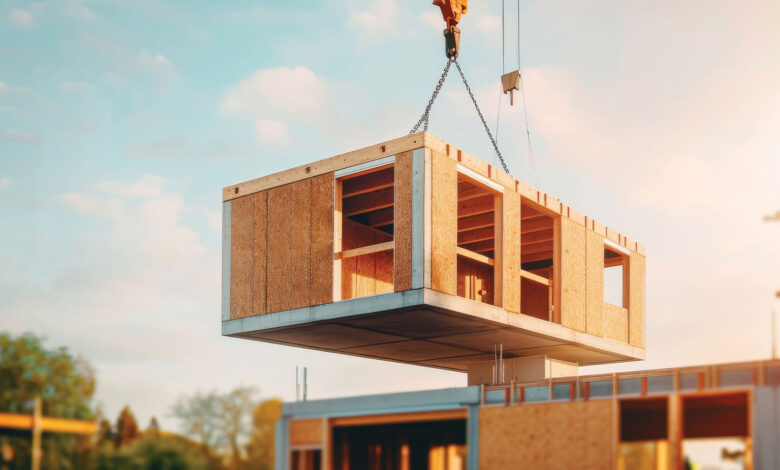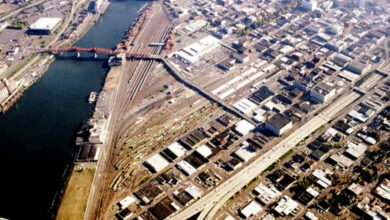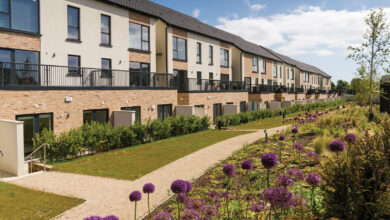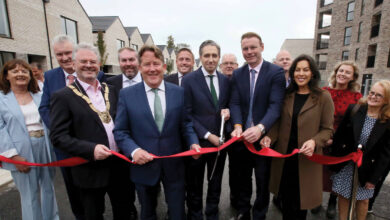MMC ‘pipeline’ needed to significantly boost housing supply

The promotion of modern methods of construction (MMC) in the residential sector can be a “game changer” in increasing annual housing supply, a report by the National Economic and Social Council (NESC) has stated.
Published to track progress under the Government’s Roadmap for increased adoption of MMC in Public Housing delivery, the report examines the benefits and challenges associated with MMC, and finds that greater potential exists to substantially increase housing supply, while also helping to meet the environmental goal of decarbonising housing stock.
However, also highlighted are a number of existing challenges to the development of MMC for housing in Ireland including, most prominently, that the benefits of MMC are not fully understood, meaning “negative perceptions exist among consumers, developers, funders, and insurers”.
While MMC is a broad category for technological advances and new product development in housing delivery, its distinct characteristic is the offsite manufacture of buildings and their components in a factory setting, alongside follow-on transportation, onsite assembly, and fabrication.
Ireland is projected to need an additional 44,000 units of housing supply per year between 2023 to 2030, and 40,000 units per year between 2030 to 2040, beyond current demand. The 2024 Housing Commission report estimated that to eliminate pent-up demand for housing by 2034, housing completions would need to increase by 50 per cent on average. Despite this, take up of MMC in Ireland is low, with only 7 per cent of firms saying offsite manufacturing is their main activity.
The report notes that despite a general industry acceptance that MMC can help reduce construction costs, propositions for scaled offsite manufacture will remain unfunded as there are not enough credible projects to bring industrialised MMC housing to market.
Highlighting industry feedback that the market for MMC in housing remains “fragmented and undercapitalised”, there is also evidence of industry optimism that this situation could change quickly with the right investment decisions.
The Chair of MMC Ireland, Declan Wallace, has suggested that MMC and onsite manufacturing companies can quickly increase annual housing output by 25,000 dwelling units, with an MMC pipeline in place to provide certainty.
Of the opportunities that exist in the further adoption of MMC identified by NESC are the expansion of MMC by established Irish homebuilders “to capture its productivity and environmental benefits, especially for timber-based MMC”, the potential to increase inward investment by international MMC companies, and the growth of Irish MMC businesses to supply both domestic and export markets.
However, multiple identified challenges have been identified for the development of MMC for housing in Ireland. Alongside negative perceptions that exist, the NESC report explains that there is a need to work closely with insurance underwriters and experts in relation to emerging and new technologies, to make sure risks are understood, particularly with regard to fire safety and insulation.
Additionally, challenges to further expansion in the use of timber relate primarily to the fire safety and material strength performance for the use of timber in residential construction. The NESC report identifies a call from industry for the need to “reframe the overall public procurement process for MMC in housing to better include specified and designated standard housing typologies”.
MMC and onsite manufacturing companies could increase annual housing output by 25,000 dwelling units.
Finally, NESC identifies the substantial differences in the finance model for MMC compared to traditional methods of construction, highlighting how the MMC value chain often requires substantial upfront investment in their fixed assets.
“Industry interviewees welcome the Government’s Growth and Sustainability Loan Scheme, although a majority also confirmed that a dedicated policy to build a finance model supporting MMC real estate development activity was not yet forthcoming,” the report says.
Acknowledging the range of current policy, structures, and processes that have been created to support the expansion of MMC in Ireland, NESC identifies six lines of action to further the expansion of MMC:
Institutional leadership: Working through more resourced existing structures, develop new MMC initiatives to address impediments to greater adoption in housing supply and renovation; reinforce and strengthen increased supply pipelines of sufficient scale, particularly social and affordable housing; and enable greater State and market collaboration on critical development issues such as standards, housing typology, finance, transport and logistics, and skills and education.
Standards and innovation: Use the Government’s Capital Works Management Framework and procurement process to shape greater housing market adoption of MMC; and research the potential role of a collaborative approach between industry and research bodies for testing and performance requirements for innovative systems.
Targets: Increase the targets and funding for new public housing using MMC under an expanded Social Housing Accelerated Delivery Programme (ADP); set more binding targets around reduced carbon footprints; and assess the investment and development of the human resources required to meet revised targets among public housing delivery partners.
Innovative finance: Consider the creation of a dedicated forward-funding arrangement for MMC in housing to lever increased investment in offsite manufacturing (OSM); guide environmental, social, and governance (ESG) investment towards MMC in housing using fiscal instruments and mechanisms; and expand the role of Ireland’s credit union sector to deliver a dedicated aggregator structure to pool financing from approved housing bodies (AHBs) for new MMC housing developments.
New employment opportunities: Provide additional supports and incentives to facilitate further upskilling for MMC roles; increase co-ordination and additional resourcing of organisations’ training programmes; and develop and fund more dedicated apprenticeship and internship options for MMC in housing.
Positive promotion: Showcase examples of quality MMC housing typologies, particularly mid- and high-rise apartments with efficient circulation including deck-access; deliver new promotional materials to challenge stigmas attributed to prefabrication; make clear that temporary use does not mean poor quality; and, request study and report by Dublin City Council on recent ‘volumetric’ housing schemes in Dublin 8 and 20, where the reception to them is considered to be positive.
Concluding, the report says that beyond the opportunity provided by MMC to deliver housing in a new, adaptive, and sustainable way, additional export and job creation benefits run in parallel with the opportunity to transition to a more circular economy.
“There is a clear need for the State to develop and promote additional MMC-specific initiatives to address impediments to its wider adoption by industry, to facilitate the knowledge-sharing among public and private sector stakeholders that can resolve regulatory obstacles and other issues, and to demonstrate the potential benefits of the sector to the construction industry and the wider public,” the report states.





